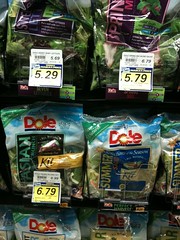Last night I cooked okra 2 ways with the same ingredients: Tomatoes, garlic, onion. At the end I added zucchini spaghetti which I made with a peeler.
Here is some more info I found online:
When you shop for fresh okra, look for good green color with few or no gray spots, firmness and moderate size, as large pods can sometimes be fibrous and too tough to eat. A good test of okra's maturity is to press a very sharp knife blade against the pod, perpendicular to its length; if it cuts easily with no resistance, it is perfect. If the knife meets resistance, the pod will be too fibrous to eat.
Besides the pods, okra leaves can be cooked or eaten raw in salads. During the Civil War, when coffee was scarce because of Union blockades, the seeds were roasted for a coffee substitute. Okra oil, which is high in unsaturated fats, is also extracted from the seeds.
Lately we have been having okra in soups and it comes out great either chopped or whole. It's a little slimy when you cut it and cook it, but the flavor is out of this world, literally like nothing else we tried.

